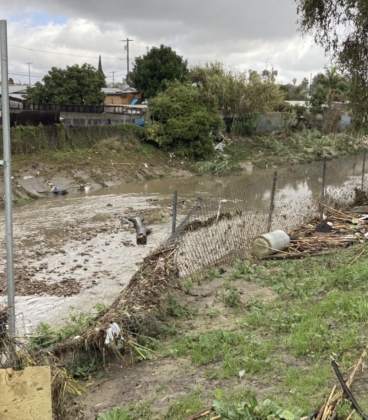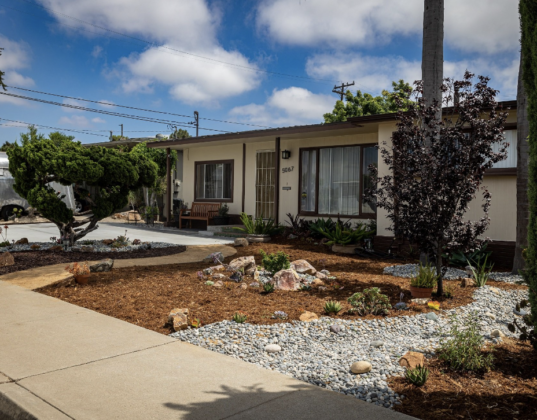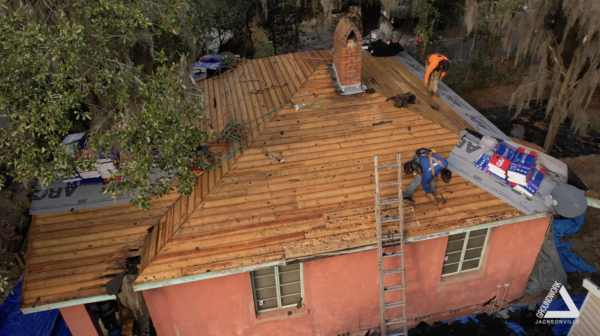From frequent flooding to extended drought, intense storms, and sea level rise, climate change is making water patterns more volatile. For people living on the frontlines of the climate crisis, these changes have an almost daily impact on life that ranges from annoying to deadly. The unfortunate reality is that these changes are here to stay, and we all need to learn to reshape our relationship with water.
Wet and wild: the polar extremes of the climate crisis

No community is immune to the impact of climate change on urban waters, but no two Groundwork neighborhoods are experiencing these changes in the same ways. In Jacksonville, FL, intense storms with high winds and strong rain are becoming more common. Sea level rise brings larger storm surges, increasing the risk of roads and property flooding in vulnerable areas. In the North Riverside neighborhood, even small rain events can cause McCoy’s Creek to flood onto the surrounding streets and cause damage to lawns, homes, and cars. Hurricanes, increasing in severity and frequency, cause significant and repeated damage to houses, stretching residents’ limited financial resources to pay for repairs and remediation.
San Diego, CA, on the other hand, is dealing with polarized water events: extended periods of severe drought interrupted by short bouts of intense rainstorms. In January 2024, after a long stretch of limited precipitation, San Diego received over a month’s worth of rain in just a few hours, which cost millions of dollars of property damage, carried waste and debris into nearby waterways, and caused widespread disruptions to roads and public transportation.
preparing homes to face changing water patterns
To help community members prepare for unpredictable weather and increase resilience at the local level, Groundwork Trusts are creating region-specific home repair and retrofit programs. These programs, designed for low-income homeowners, model how individuals can take action to change their relationship with water while meeting a critical need for community members, many of whom are struggling to stay in their homes as the costs for repairs and mitigation exceed their budgets.
Each program is as unique as the community that it is designed to serve.

Groundwork San Diego Chollas-Creek (GWSD) is working directly with low-income residents in the Webster and Oak Park neighborhoods to implement green infrastructure solutions that help manage drought and flash flooding by reducing residents’ overall water usage and increasing stormwater capture. Through this residential retrofit program, GWSD works individually with residents to redesign lawns with drought-tolerant plants, decorative rocks, and mulch to retain moisture, and irrigation systems, rainwater tanks, and rain gardens to manage stormwater. In the year since GWSD established this program, these housing retrofits have kept a total of 28,544 gallons of rainwater out of the storm drain and have conserved over 3,000 gallons of water per home retrofitted.
In addition to infrastructure improvements, GWSD is doing extensive community outreach and education around water use and conservation, water management strategies, and the importance of protecting the Chollas Creek watershed. The education component is a key part of this program. “What often gets neglected in the process of building climate resilience,” Bruce Strouble, Groundwork USA’s Senior Manager for Equitable Climate Resilience Programs, says, “is adaptive capacity – the ability of residents in vulnerable communities to fully understand how climate change is impacting them and drive discussions about the resources they need to adjust to changing circumstances.” Community members can only make proactive decisions about their behaviors if they are properly informed about the risks they face.
Similarly, Groundwork Jacksonville (GWJax) saw a clear need to prepare homeowners in the North Riverside community for the impacts of climate change and reduce frequent flooding near McCoy’s Creek. In collaboration with local partners, GWJax established a home repair program to help modernize and weatherize homes owned by low-income residents in the community. Many of these homes have been in their families for generations and have extensive repair needs, including roof replacements, plumbing and electrical systems updates, mold remediation, landscaping, and tree maintenance.

By repairing roofs, addressing water damage, and implementing appropriate landscaping, these homes can better manage large quantities of water and are overall more resilient to climate change, saving residents money on future repairs and allowing them to stay in their homes long-term. Mr. Bryant, one of the homeowners who participated in the home repair program, discusses how it has impacted his life in this video.
Despite the differences in how their communities experience water-related climate impacts, both GWSD and GWJax recognize the importance of centering residents’ needs in addressing water challenges exacerbated by climate change. Bruce explains, “By retrofitting residents’ homes, which are often the first line of defense against disaster, Groundwork San Diego and Groundwork Jacksonville are going to reduce the amount of damage residents experience from climate change and extreme storms. These programs make it so that these communities can survive the initial blow before starting the recovery process.”
